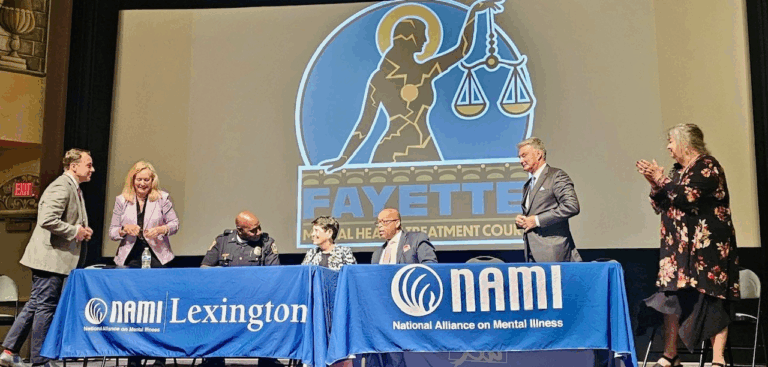 Last week I was immersed in two very different professional experiences. They both represent things of great passion and expertise, but I haven’t seen them as connected. This week, I have another perspective. They are absolutely connected as both operate at the leading edge of thought with similar values and processes – they are the catalysts of change!
Last week I was immersed in two very different professional experiences. They both represent things of great passion and expertise, but I haven’t seen them as connected. This week, I have another perspective. They are absolutely connected as both operate at the leading edge of thought with similar values and processes – they are the catalysts of change!
WHAT WAS I DOING?
The first of the week, I helped facilitate the SAMSHA GAINS Center Reentry Policy Academy in Washington DC. Five communities, from around the country, were brought in to hear from experts on what it takes to create better environments for people with mental illness to successfully reenter from jail and prison. As we know, we incarcerate more people than any country and our recidivism rate is abysmal – we have to change and these communities are leading the way!
The second half of the week, I was involved in the Transformational Presence Leadership and Coaching (TPLC) Global Summit in Connecticut. People from 9 countries assembled to expand their knowledge of the concepts for creating change as Transformation Coaches working with individuals and leaders in business and industry. Alan Seale, the founder and director of TPLC, has gathered a community of thought leaders, whose work is also leading change.
WHAT’S REQUIRED FOR CHANGE?
Interestingly, but no surprise, both venues reflect similar values and processes. They are the foundation for the consciousness raising changes that are occurring in small pockets all over the world. What do these very different communities of change agents have in common? Here is a synthesis of what I learned and observed:
THE VALUES:
There is a Higher Truth in Operation
Underpinning these change processes are core values in our relationships to each other and the problems that we want to address. We use not only intellect, but also intuitive and instinctive reactions to discern our response and choices.
The values are person centered, engaging, allowing and understanding. The needs of the individual are considered and systems are organized around them, rather than being organized around the convenience of the system.
It reflects a new degree of compassion, empathy and openness to understand and not judge. Rather than being tough and strict in response, there is flexibility and adaptiveness to change. Individuals are being treated respectfully, conflicts are being addressed one on one rather than through top down edicts – there is open hearted responsiveness. These approaches create huge changes in business and social justice systems
THE PROCESSES:
1) Gather Information Far and Wide
Expertise isn’t just from the ivory tower of the most credentialed in isolated fields. Information is being synthesized from widely different areas, the most powerful coming from those who are most affected.
In the social justice field, massive system changes are needed in every sector to undo injustices from incarcerating people with mental illness. Information is coming in from every arena to drive the change process. Behavioral health consumers are driving it by taking charge of their own treatment and mentoring others. Best practice research in behavioral health and substance use offers new and unique approaches. New ideas and policy changes are creating new policing practices, problem solving courts, jail policies, more flexible probation standards, fair housing and equal employment opportunity.
The same trend is being seen in leadership and HR circles. The new thoughts driving change come from social change theorists, systems researchers and quantum physics. It’s being synthesized into new concepts to address the needs of our” VUCA” world – as we are living in in times that are more “vulnerable, unstable, complex and ambiguous”. The needs are different and the solutions are no longer linear. It requires new ways of thinking and responding.
2) Collaborate, Listen and Integrate
In both social justice and leadership arenas, change occurs when all parts of the system understand their impact on each other. Silos no longer work, collaboration is essential to understand how one part of a system, family or organization relates to the other. Change in one creates change in the other. Synthesizing all the factors involved is essential for change to be meaningful and lasting.
The days of autocratic, hierarchical leadership is being challenged and falling apart. Being a leader or change agent requires listening to everyone involved at every level, working in small groups and synthesizing all components. Listening and integrating information has become one of the most important skill sets.
3) Create A Container for Creativity and Trust
Both groups are creating powerful and successful change in small gatherings. They have created the right environment for new ideas and new work processes to take hold.
The concept of “creating a container” actually comes from “Design Thinking” at Stanford University. When our work or living space allows for a more open flow of people and information, there is an unspoken invitation for more creativity. This concept, when applied to social changes, includes creating an environment of trust.
A creative and trusting environment includes small circles of like-minded people who are willing to explore in an open and honest manner. In both venues last week, this was evident. In short time, both groups were able to accomplish a tremendous depth of learning and sharing, with a commitment toward taking their changes out into the world.
4) Ask The Right Questions
The foundation for Transformational Leadership and Coaching is in the questions that are asked. They help get people to the heart of what wants to happen. It’s not a linear problem solving formula. It’s not a business plan. It’s about opening yourself to the potential that is emerging – it means paying attention to the how things are unfolding and asking the right questions.
• What wants to happen – what is the opportunity for change?
• What is this change asking of me – who do I need to be?
• What is it asking me to do – what is the next step?
These three simple questions take us to a deeper level of inquiry and understanding. It helps us look at what is emerging and the natural direction of change. It helps us take more responsibility to step up to new challenges. And finally when it is time to take action, it invites us to initiate the next logical step, trusting that the flow of change will define the ones that follow.
In social justice, these kinds of questions, with different words, are being asked at every intercept. Crisis workers, law enforcement personnel, jailers, judges, probation and parole officers are all noticing that something different needs to happen. They talk about what wants to be different, they step up to take more responsibility and then take the next step to try new approaches. By asking these questions, it invites change at every level.
5) Experiment and Learn
To create change means trying new things, seeing if it works and not worrying about failure. As the old paradigms dissipate, people are taking bold new steps to be creative. Failure is simply part of the change process that defines the next step.
In both professional venues, I see this in action. In social justice, prisons are closing, jails are emptying out low level offenders and Judges are setting up problem solving courts with more flexibility and services attached. In business, large corporations are setting up smaller think tanks for creative projects and training leaders to be more sensitive and responsive. In pockets all over the world, people are trying new things, seeing if it works, and using that information to make the next move forward.
How does this information impact you? Are you longing for a change process to take hold in your life or work place? You are welcome to inquire for more information and direction at my website, www.spectrumtransformation.com.Free consultation is offered to help you determine your helpful next step.
Resources:
• The SAMSHA GAINS Center offers information on consultation, training and grants to create social justice changes: http://www.samhsa.gov/gains-center
• The Center for Transformational Presence offers leadership and coaching training and consultation: http://transformationalpresence.org








